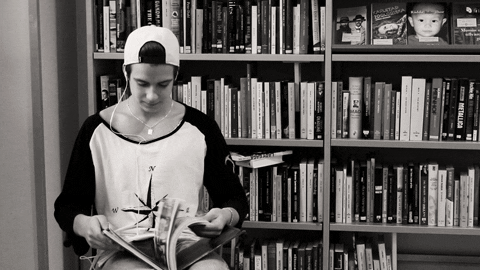Everybody is different, so it’s no wonder that we all learn differently as well. Each of us absorbs information in our own way – maybe you need to take detailed notes in class, but your friend prefers to record the lecture and listen to it later? We all have different learning style(s) and it’s all down to finding what kind of learner you are.
Knowing your individual learning style can really help you at university – whether you’re making notes, revising, researching or writing. Read on to find out which style of learning suits you best, and how to use it to study effectively!
Are you…
A visual learner?
Visual learners like to see information, and work best when they can visualize the relationships between different ideas.
You might be a visual learner if you:
- like to see information presented in front of you
- would close your eyes to visualize the location of something you’ve lost
- enjoy watching videos that show how to do or make things
- find it easiest to follow the diagrams or photographs in a set of instructions
- can remember the cover of your favourite books – but can’t remember many quotes
Study tips for visual learners
- Use charts, concept maps and diagrams to help you visualize your notes.
- Colour-code your writing using highlighters and coloured paper.
- Make sure to schedule in plenty of self-study time – you need to concentrate on looking at your notes, and might be distracted by too much noise.
- Sit near the front in lectures and seminiars so that you can see everything properly.
An auditory learner?
For an auditory learner, hearing information is the key – they prefer listening to reading, writing or using graphs.
You might be an auditory learner if you:
- are at your most relaxed when you listen to your favourite songs
- prefer listening to a lecture rather than reading outside of class
- are best at memorizing dance moves when you focus on the music
- find it distracting to take notes during a lecture – you need to listen properly
Study tips for auditory learners
- Ask a friend to read out questions so that you can answer them out loud.
- Repeat key facts, figures and names that you need to remember.
- Record your lectures (with your tutors’ permission) so you can listen to them back through your headphones.
- Find podcasts related to your subject and listen to them in your spare time.
- Create songs or rhymes to help you take in important information, sequences, equations or lists.
A reading/writing learner?

Yep, you guessed it! Reading/writing learners like to read/write information to help them remember it. They find it more helpful to interact with text than images, graphics or audio.
You might be a reading/writing learner if you:
- enjoy reading in your spare time, and choose it when you need to relax
- prefer researching and making your own notes from library books to hands-on workshops
- find that you forget everything if you don’t take notes during a lecture
- do better in written exams than practical tests or group work
- like following written lists of detailed instructions when setting something up
Study tips for reading/writing learners
- Take lots of detailed notes during every class, lecture and workshop – writing out notes will help the words of your tutor stick in your head.
- After class, re-write your notes to make index cards.
- Condense long paragraphs of text into easy-to-read bullet pointed lists that you can easily review.
- Turn diagrams and charts into text – explaining them in words will help you to remember key facts and figures more easily.
A kinesthetic learner?
This one isn’t as obvious – but the word ‘kinesthetic’ describes movement, so this type of learner prefers physical activity and ‘doing things’ to sitting down and making notes.
You might be a kinesthetic learner if you:
- like to handle physical objects, and try to find out how things work yourself
- remember things best if you’ve done them yourself
- get fidgety and distracted if you try to read for too long
- find exercise the best way to relax and unwind
- prefer hands-on workshops to sit-down lectures
Study tips for kinesthetic learners
- Find ways to be active as you learn, such as walking or pacing as you read, which will help you to stay engaged.
- Take regular breaks when you’re studying, as you’ll definitely lose interest if you try to sit still for too long.
- Make the most of group study sessions and stand up to teach your classmates what you’ve learnt.
- Instead of listening to music during your morning run or gym session, listen to recordings of your notes or a podcast about your subject.
If you think you recognize elements of multiple learning styles, then you’re probably right – most people will find that they are a mixture of two or more types of learner.
If that’s you, try mixing and matching different study tips to create your own personalized list!
To find out more about studying abroad, head over to our website.
You may also like to read about:


























